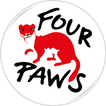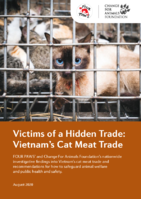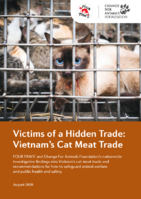
A Report on The Cat Meat Trade in Vietnam
FOUR PAWS and Change For Animals Foundation release a ground-breaking, new report that uncovers the insidious cat meat trade in Vietnam.
Cats play a special role in Vietnam. For thousands of years, these inquisitive creatures have worked alongside farmers to protect grain crops from rodents. Today, they continue this important role but now have also taken on a new role in our societies, joining many of us as cherished family members, bringing us much joy and comfort as indispensable companions.
But this special relationship is under attack from the illegal, cruel, and dangerous cat meat trade, with cat owners living in constant fear of their pets being stolen to be slaughtered, cooked and served in restaurants. Thousands of cats are disappearing every day due to rampant theft. Families across the country are devastated after their pets go missing, often desperately searching for their beloved companions in filthy slaughterhouses and in restaurants. This has led to a growing public outcry in Vietnam against the cat meat trade.
The recent COVID-19 pandemic also brings into stark reality the dangers of the live animal trade. The conditions seen at Wuhan, the likely origin of COVID-19, include animals kept in cramped and brutal conditions, unsanitary practices, and the mixing of several species including sick animals. This all leads to an ideal environment for the emergence of new viruses and also all occur throughout Vietnam’s cat meat trade. The global devastation wreaked by COVID-19 – not only in terms of lives lost but also economically – should serve as a stark warning and points to our need to re-evaluate how we treat animals, including those taken for the meat trade. In addition, the cat meat trade’s practices inhibit Vietnam and the world’s efforts to eradicate rabies, with laws on animal movement and rabies control being blatantly flouted by those involved in the trade. Sadly, despite the dangers and the health risks that the cat meat trade poses, our investigation has shown that the trade is now spreading throughout Vietnam.
There is no doubt that the theft, transportation, slaughter, and consumption of cats relies on illegal activities and lack of law enforcement, and action must be taken now to strengthen and enforce laws against the cat meat trade to bring it to an end.
FOUR PAWS’ and Change For Animals Foundation’s nationwide investigative findings into Vietnam’s cat meat trade and recommendations for how to safeguard animal welfare and public health and safety.
Read the whole report (compressed resolution) here:
Here you can find the report in a higher resolution (5MB). Please be aware though, it could take a bit longer to load this PDF (depending on your internet connection):
Note: Any advertisements that may appear during the viewing of this video are unrelated to FOUR PAWS. We assume no liability for this content.
Executive summary
The exact origins of cat meat consumption in Vietnam are unknown, but available data and testimonials suggest that it has increased in popularity only in the last decade. Once a relatively small-scale and opportunistic trade localized in the North of the country, today’s cat meat trade consists of complex international and trans-provincial trading networks spanning distances of over 1,000 km (over 620 miles), connecting holding areas to restaurants and slaughterhouses, and generating significant profits for those involved.
Cat meat, referred to in Vietnamese as "thịt mèo" or "little tiger'" is now available throughout Vietnam, and the inherent cruelty and suffering endured by the over one million cats involved in the trade each year is immeasurable. The brutal nature of the theft, grueling and long-distance transport, cramped holding, and cruel slaughter is further exacerbated by cats’ unique sensitivity to stress.
Those involved in the trade are profit-driven, acting in breach of laws and regulations that exist to prohibit the trade, as well as relying on the lack of enforcement of these laws. Unlike Vietnam’s dog meat trade that is neither explicitly illegal nor regulated, there is a precedent in Vietnam for an explicit ban on the hunting, slaughtering, and consumption of cats, under a Directive issued by the Prime Minister in 19981 that was in place until 2020. There are laws and regulations in place that, if enforced, would offer cats protection from the trade. However, with little enforcement thus far, the trade in cats goes largely unchallenged, and the situation is further confounded by evidence that suggests that many of those who are responsible for enforcing the laws (police and anti-corruption units) are actually involved in the trade, as well as the consumption of cats.
Both cat and dog theft in Vietnam is rampant. Cat populations are being decimated in some areas, driving up the price of meat and encouraging more and more brazen and aggressive behavior from those profiting from the trade. This in turn has resulted in further societal unrest and violence, and in extreme yet increasingly frequent cases, vigilante justice in the form of thieves being seriously injured and even killed by infuriated pet owners.
In 2019, FOUR PAWS and Change For Animals Foundation (CFAF) commissioned nationwide investigations into Vietnam’s cat meat trade. This report, detailing the workings of the trade, is believed to be the first of its kind, and the findings are shocking:
- While often overshadowed by the dog meat trade in the media, the cat meat trade affects over one million animals each year. Black cats in particular are targeted for their purported medicinal value.
- Cat meat consumption is increasing in popularity; sourcing sufficient cats to meet demand is getting more difficult.
- To meet national demand, cats, many of which are owned, are stolen off the streets or from homes, and trafficked on long journeys, sometimes lasting for days without food or water. The conditions are barbaric, and many die whilst being trafficked from heat stroke, exhaustion, or injuries incurred during capture and holding.
- Slaughter methods are brutal, and commonly involve drowning and bludgeoning. The suffering of the animals involved is immense.
- Motivations for cat meat consumption vary, but its consumption has strong links with superstition, medicine, and as part of dietary tradition.
- There is a precedent in Vietnam for an explicit ban on the hunting, slaughtering and consumption of cats, which could be reintroduced.
The recent COVID-19 pandemic has brought global attention to the dangers that live animal markets pose to public health and safety. The investigation presented here demonstrates that markets, slaughterhouses, and restaurants involved in the cat meat trade are often concurrently involved in the illegal wildlife trade and trade in dog meat. As a result, Vietnam’s cat meat trade presents conditions almost identical to those seen from COVID-19’s likely source in Wuhan, China. It is imperative to end the cat meat trade in an effort to protect public health, including a disastrous prospective future pandemic.
FOUR PAWS and Change For Animals Foundation thereby call on the Vietnamese government to take strong and immediate action to enforce and strengthen laws and regulations that would serve to restrict and ultimately prohibit the trade in, slaughter, and consumption of cats. This need is based on the extreme cruelty involved, its reliance on illegal and dangerous activities, its risk to public health, and the societal discontentment and unrest it causes due to people's companion animals being stolen for the trade.
Source



